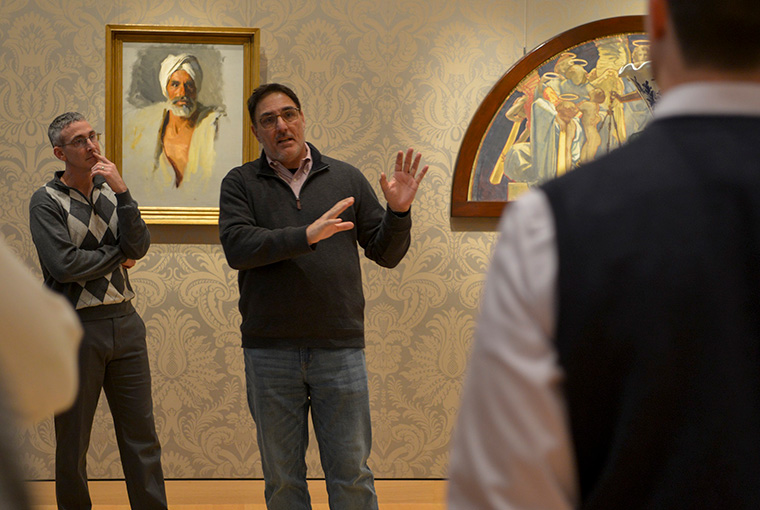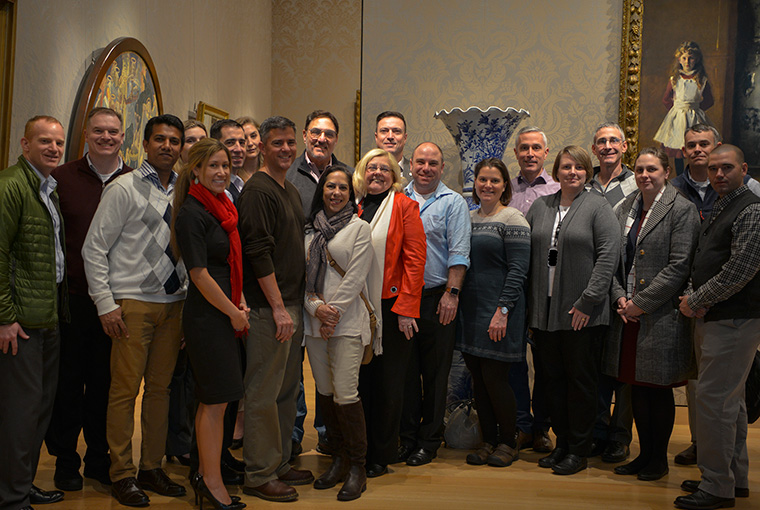‘Tough guys’ and poetry: U.S. Naval War College course uses art and literature to teach about war

NEWPORT, R.I. -- With the goal of humanizing the history of war, professor Yvonne Masakowski leads a U.S. Naval War College class that might seem unusual for a military institution: It focuses on the arts.
Her students dig into the paintings, poetry and prose of a different period of war each week.
For example, the class reads the 1862 Herman Melville poem “Shiloh: A Requiem” when studying the Civil War. Students sift through Abigail Adams’ letters to her husband during the American Revolution.
“It’s really about the human side of history,” said Masakowski, a psychologist who is an associate professor in the College of Leadership and Ethics.
“The humanities get you thinking critically about, ‘I’m doing these things today on the battlefield, but these things also happened back then.’ You know, why do people fight? Why did a farmer pick up his gun? You look at what is the inspiration for war.”
This elective course, and other humanities classes offered by the college, are an acknowledgement that the study of war isn’t just about firepower, officials said.
“Our students learn that war is a fundamentally human affair infused with passion and chance, distorted by long memories of real and perceived grievance, shaped by differing views of what future victory looks like,” said Tim Schultz, associate dean of academics for electives and research.
Students can also take Anthropology of War, Ethics of Technology and biography-based courses on George Washington and Abraham Lincoln, for example.
Masakowski’s class travels to the Boston Museum of Fine Arts each term. They face off with works by John Singleton Copley, Winslow Homer and Edouard Manet, in particular.
And they have an unexpected tour guide: Tom Culora, dean of the Center for Naval Warfare Studies.
Culora, a professional visual artist outside of his job in academia, talks to the class about the historical and cultural context of the art they are viewing.
“I want them to understand how art fits in to understanding society and, by extension, understanding a society in crisis,” said Culora, whose own mixed-media art has been exhibited regionally, nationally and internationally.
“We looked at pre-Revolutionary War work, such as Copley, to understand visually and conceptually how that work is juxtaposed against young America vying for its independence from England,” he said.
“As artists were establishing their own visual identity, the country was establishing its cultural and political identity at the same time.”
This elective course, called Leadership and War Viewed Through the Humanities and co-taught by Cmdr. Tom Baldwin, is in its fourth year and is popular with students.
Lt. Cmdr. Abdullah Noman, a Naval Staff College student from the Bangladesh Navy, noted that he is studying the same wars in his other courses -- but from a much different perspective.
“We discuss various statistics like loss of ships, aircraft and troops by both sides to support our analysis. I feel like the losses of lives are nothing more than numbers to us,” Noman said.
In his humanities class, they look at wars from the perspective of the soldier trapped in the trench, he said. “I think it is enhancing my emotional intelligence -- which I believe is one of the most important qualities a leader must have.”
There are other field trips, as well.
When studying the American Revolution, the group travels to Charlestown, Massachusetts, to hold class aboard the USS Constitution, the famed fighting ship from the late 1700s. The class also meets at the downtown Newport Irish pub Buskers to discuss the Irish Rebellion.
The final project is an original poem on a topic of personal significance, composed by each student and read in front of the class. The poems don’t have to focus on military service, and students have written about family strife and racial injustice, for example.
Masakowski said it’s a daunting assignment for many officers. Her students may be experts in missiles and machine guns, but many are humbled by meter and rhyme.
“I had a student, when he first came to my class, he said, ‘I don’t write poetry, ma’am. I’m not going to do this,’” she said.
The student was a military pilot and a bodybuilder – a real “tough guy” on the outside. Masakowski told him it would be worth the work.
“Eventually he wrote three poems,” she said. “They were very powerful.”
An excerpt from a student poem
I SEE YOU
By Air Force Lt. Col. Felix L. Cole
Get out the car now he yells, Inside I’m screaming, God don’t let this be the day
I comply fearfully with yes sir and no sir, just as I have taught my son to say
I SEE YOU
My mind races, my memories flash and all I can see is a fatherless son
My hands are sweating, my heart is racing, Damn it I didn’t do anything wrong
I SEE YOU
Will I be a hashtag, will I be a movement, or just another story that is read
It won’t matter for the little black boy in the backseat, his father is now dead
 Students in the U.S. Naval War College course Leadership and War Viewed Through the Humanities visited the Boston Museum of Fine Arts on Jan. 16, 2019.
Students in the U.S. Naval War College course Leadership and War Viewed Through the Humanities visited the Boston Museum of Fine Arts on Jan. 16, 2019.(U.S. Navy photo by Jeanette Steele/released)
